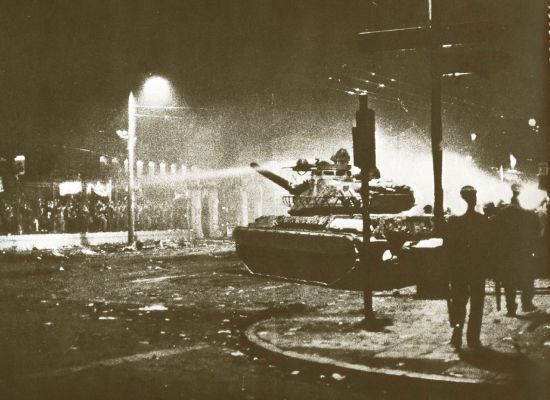
16-11-16 Education Minister Gavroglou commemorates Athens Polytechnic uprising
A good education is inconceivable without democracy, and democracy is inconceivable without essential education. That is the message of the Polytechnic [uprising], the importance of which each anniversary of it reminds us. It reminds us that in our country the struggles for education were very quickly linked with the demand for democracy and freedom, and that these values were never and never should be viewed as a given. They require constant vigilance.
The Polytechnic became a symbol of youth rising up against oppression, and demanding a better and more just future. It became a symbol because it constitutes a pinnacle of a series of dynamic demands regarding education that marked 20th century Greece.
The demand for education as a democratic good was incorporated early on in the programme of progressive forces in the country. The youth pursued its demand for education and freedom with the slogan 114, the final article of the constitution, which provides that its protection depends on the patriotism of the Greeks, and the youth at the start of the 1960s demanded radical educational and social change. Their struggle was crowned with success. Just a few years later, the winds of democracy blew in schools and universities, and free education was established.
The dictatorship, established by the colonels in April, 1967, violently disrupted this development. From the very first years, the most restless spirits among the youth, university students, created resistance groups. With individual and collective efforts, at first hesitantly, and more dynamically as years passed, the youth of the country demanded selflessly and with self-denial freedom and democracy. For a number of them, the price of the struggle was torture and prisons.
In 1973, the last year of the dictatorship, there was a continuous tumult in universities. The youth put forth dynamically their demands for academic and social freedom, for a release from oppression, for their right to work and life. They put their very lives on the line. It began in February, 1973 with the occupation of the law school, which was led by the students but supported fervently by intellectuals and citizens. The apogee of this climate was the uprising of students at the Polytechnic, which quickly evolved into a broad popular uprising. It was an uprising with casualties and deaths, youths who selflessly gave their lives so that today we may enjoy freedom and democracy.
The Polytechnic uprising became a symbol of the struggle and sacrifice of youth for democratic education and freedom. This is an important symbol, which transcends the limits of the country’s history, embracing the youth all around the world that struggle for these values. It is a living symbol, with its message updated on every anniversary. The anniversary is a commitment regarding the duty of future generations to ensure that the sacrifice of the youth who struggled against the oppression of the dictatorship and demanded education and democracy, was not in vain.
Much has changed between then and now. Its legacy has been disputed, and instead of a symbol inspiring unity, the Polytechnic is in danger of being transformed into a memory that divides. It is important for you, the youth, to be able to stand above the difficulties and bitterness that often distort the way the older generations confront their past. All of us older people carry our own defeats and obviously our mistakes. For you, however, who are the hope of this country, it is important to hold on to the message of this anniversary – the decision and struggle of the youth to change the world. And they changed it.
